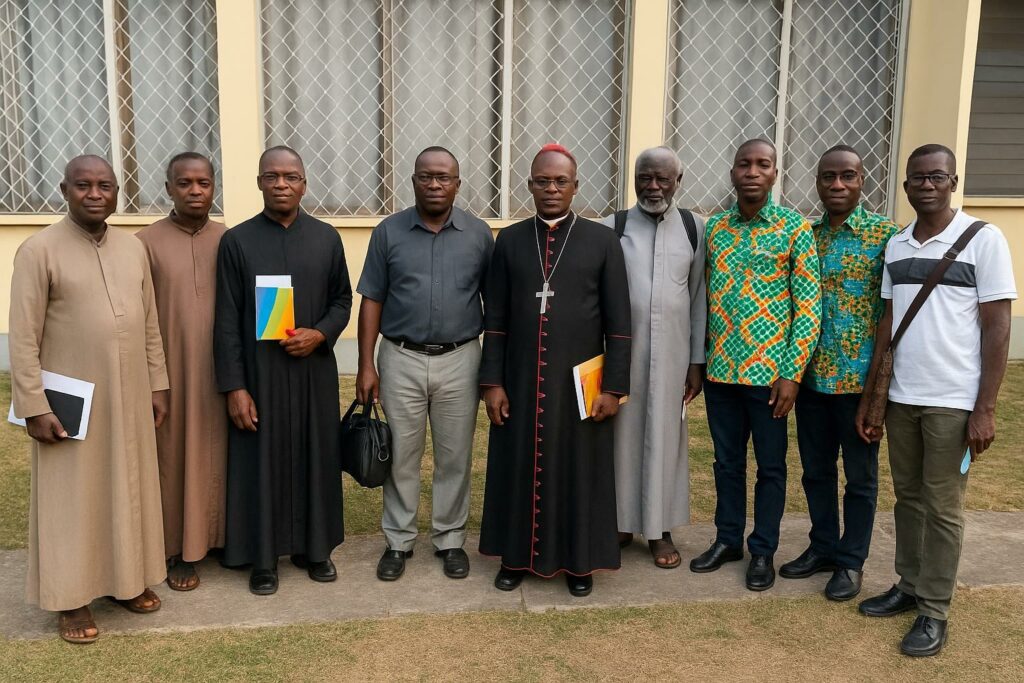Brazzaville gathering underscores disciplined practice
On 22 July 2025 the normally quiet corridors of the Centre Interdiocésain des Œuvres in Brazzaville resonated with a vocabulary seldom heard outside specialised theological faculties: discernment of spirits, prayer of liberation, minor and major exorcisms. Convened under the aegis of Archbishop Abel Liluala, metropolitan of Pointe-Noire and national coordinator for the Catholic Charismatic Renewal, the second session for Congolese exorcist priests unfolded behind closed doors yet in strict conformity with Church procedure. The theme, “The practice of exorcism”, set an academic tone that contrasted with the sensationalism often surrounding the topic in popular culture.
In his opening remarks Archbishop Liluala reminded the clergy that an exorcist is never self-appointed but formally mandated by the local ordinary, anchoring the ministry in ecclesial obedience rather than personal charisma. Citing Pope Paul VI’s famous 15 November 1972 address on the reality of evil, he invited participants to balance boldness with theological sobriety: “We are surrounded by two powers — the power of God and the power of the devil — yet only one deserves our allegiance.”
Experience sharing 2023-2025 enhances pastoral toolkit
The core of the session consisted of a detailed review of field experiences gathered across the country since the inaugural meeting in 2023. Father Aimé Mobwete Salumu, exorcist in Cotonou and vice-coordinator for Francophone Africa, synthesised the reports, emphasising the value of pre-exorcism discernment days and multidisciplinary collaboration with psychologists when required. Although statistics remained confidential, several clerics pointed to a moderate increase in requests for spiritual assistance, a trend they attribute more to heightened awareness than to any surge in occult practices.
Such exchanges, noted Father Jhob Ellery Dashiel Mboukou of Brazzaville, help younger exorcists avoid improvisation: “A single imprecise formula can unsettle a vulnerable family; we therefore rehearse each prayer in Latin and in vernacular languages until they become second nature.” His testimony illustrated the pragmatic spirit that prevailed over the three-day deliberations.
Leadership continuity within the charismatic movement
At mid-session the priests quietly proceeded to the renewal of their national bureau for a three-year mandate. Father Jack Harold Nkodia, serving the Archdiocese of Brazzaville, was entrusted with the coordination, assisted by Abbé Jean-Marie Nsimba of Nkayi. Abbé Guy Roland Mouyamba of Kinkala assumed the secretariat while Abbé Paul Massamba of Impfondo took over the treasury. The vote, conducted by secret ballot according to internal regulations, preserved geographic balance among dioceses and ensured continuity with the outgoing team.
Accepting the modest yet demanding portfolio, Father Nkodia pledged to maintain an ethos of collegiality: “Our real authority lies in our capacity to listen first, pray second, and only then pronounce the Church’s ritual words.”
À retenir : institutional safeguards against excess
Beyond personal piety, the session placed institutional safeguards at the centre of discussion. Every diocese, Archbishop Liluala reiterated, must officially designate one trained exorcist to avoid the proliferation of unlicensed deliverance ministries. Participants committed to updating registries of authorised practitioners and to forwarding annual activity summaries to the Episcopal Conference, thereby strengthening traceability and accountability.
Le point juridique : canon law and civil liability
Canon 1172 of the 1983 Code of Canon Law reserves the rite of exorcism to priests with explicit episcopal permission, a clause designed to protect both the faithful and the Church from potential abuses. While no contentious case has reached Congolese civil courts recently, the clergy remain aware that any perceived psychological harm could trigger litigation. The new bureau therefore plans to organise workshops on informed consent and record-keeping, ensuring that pastoral zeal remains compatible with national legislation on personal integrity.
Synodal spirit echoes Pope Paul VI’s warning
Archbishop Liluala’s closing address relied heavily on the vocabulary of synodality promoted by Pope Francis. By urging the bureau to “work more and walk together”, he framed exorcism not as an isolated combat but as part of the Church’s broader mission of accompaniment. His words found particular resonance among priests from rural dioceses, where isolation can magnify the burden of spiritual counselling.
Central African network widens after Kinshasa milestone
The Brazzaville programme also looked beyond national borders. Delegates recalled the regional assembly held from 8 to 10 August 2025 at Centre Nganda in Kinshasa, Democratic Republic of Congo, which laid the groundwork for a Central African resource pool of trainers and liturgical translators. By aligning its schedule with that continental calendar, the Congolese bureau signals a willingness to participate in a coherent African response to pastoral challenges posed by syncretism and secularisation alike.
For the moment, however, the priority remains domestic: consolidating a disciplined, prayer-centred ministry capable of combining doctrinal fidelity with compassionate listening. In a society where informal healers can wield considerable influence, the Church’s measured approach may well offer both reassurance and rigor — a quietly persuasive antidote to fear.

